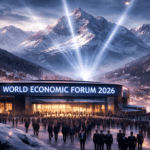In 1985, Mike + The Mechanics released “Silent Running,” a synth-laden pop hit built on a science-fiction premise. The song’s co-writer, Mike Rutherford, explained it as a story about an astronaut in the future trying to warn his family on Earth of an impending societal collapse. It’s a tale of distance, desperation, and a message sent across a void, uncertain if it will ever be received. Yet, nearly four decades later, the song’s haunting lyrics serve as one of the most powerful and unintentional allegories for the human experience inside the 70-year Israeli-Palestinian conflict.
Art has a unique ability to transcend its creator’s intent, offering a language for emotions that political discourse cannot capture. For anyone seeking to understand the psychological reality of this protracted struggle, the themes woven through “Silent Running” are more illuminating than a thousand news reports. The song is not about the Middle East, but it has become a haunting soundtrack for it, articulating the visceral fear, the agonizing isolation, and the grim inheritance of a conflict that feels both apocalyptic and unending.
The song’s opening verse immediately establishes a state of perpetual, imminent danger: “Take the children and yourself and hide out in the cellar / By now the fighting will be close at hand.” For millions of Western listeners in the 80s, this was dystopian fiction. For generations of Palestinians and Israelis, it is a lived reality. This is the frantic calculus of a parent in Gaza hearing the buzz of a drone, or a family in an Israeli border town running to a bomb shelter with seconds to spare. The “cellar” is not a metaphor; it is a concrete reality, a physical space of refuge against a threat that is never distant. The lyric captures the normalization of crisis, the grim routine of a life punctuated by violence, where the primary duty is the frantic protection of one’s children from a fight that is always “close at hand.”
This constant state of emergency is compounded by a profound sense of isolation, a feeling that the world is not truly listening. The song’s pleading, desperate chorus becomes the conflict’s central cry: “Can you hear me, can you hear me running? / Can you hear me calling you?”
For decades, Palestinians have sent this message from a place of occupation and displacement. Their calls for self-determination, for an end to settlement expansion, and for basic human rights have been broadcast in protests, in art, and in countless UN resolutions that are ultimately vetoed or ignored. They are running—navigating checkpoints, fleeing violence, struggling for dignity—and calling out to a world that seems to offer only fleeting sympathy before changing the channel. The signal is sent, but the line feels dead.
From an Israeli perspective, the same agonizing call is made. It is a call for the world to understand their deep-seated need for security, born from a history of persecution that culminated in the Holocaust and reinforced by decades of regional hostility. They feel their narrative is often delegitimized, their security fears dismissed as aggression, and their existence as a Jewish state constantly questioned. They, too, are running—maintaining a state of military readiness, fighting diplomatic battles—and calling out for legitimacy and security in a world they often perceive as biased and hostile. For both sides, the “silent running” is the exhausting, continuous effort to be heard and understood by a global community that has long since chosen its preferred narrative.
This feeling of abandonment has cultivated a deep and corrosive distrust in established power, another core theme of the song. The narrator offers a stark warning: “Don’t believe the church and state and everything they tell you / Believe in me, I’m with the high command.” This lyric perfectly captures the disillusionment that permeates the conflict. Decades of failed peace processes, broken promises, and biased international mediation have left both Israelis and Palestinians cynical about any solution imposed by external powers. The “church and state”—the international institutions, the global superpowers—are no longer seen as honest brokers but as entities pursuing their own interests.
The result is a retreat inward. Trust is placed not in governments or global bodies, but in one’s own community, one’s own narrative of survival. The “high command” becomes the family, the tribe, the ideological faction—the only voices deemed worthy of trust in a world of deceit. This erosion of faith in a shared, objective authority is what makes the conflict so intractable. When you believe no one but your own side, compromise becomes betrayal and peace becomes a fantasy.
Perhaps the most tragic parallel lies in the song’s final verse, which speaks to the grim inheritance of the struggle. The astronaut’s final instruction is not one of hope, but of grim preparation for a battle he will not be there to see: “Teach the children quietly / For some day sons and daughters / Will rise up and fight while we stood still.”
This is the heartbreaking reality of a multigenerational conflict. It is a legacy of trauma passed down. Palestinian children grow up with the stories of the Nakba, the keys to homes they’ve never seen, and the reality of occupation as their birthright. Israeli children are raised on stories of the Holocaust, the existential threat of annihilation, and the necessity of military service to ensure survival. The children are taught “quietly” through family stories, school curricula, and the daily realities they witness. They inherit the responsibility to continue the struggle their parents could not resolve. The phrase “while we stood still” is a devastating indictment of the political paralysis that has allowed this cycle to continue, a stalemate where the only tangible action is to prepare the next generation to fight the same battles.
“Silent Running” was never intended to be a political anthem. But by giving voice to the universal human emotions of fear, isolation, and the desperate hope for a future you cannot control, it has become a mirror. It reflects the soul-crushing experience of living in a conflict where everyone is running, everyone is calling out, and almost no one feels heard. To truly listen to the song today is to hear the echoes of these calls from both sides—a plea not just for survival, but for the one thing that might finally end the running: to be truly and finally understood.












